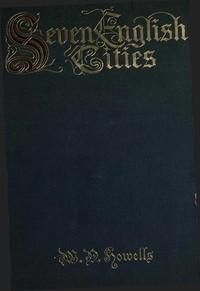Read this ebook for free! No credit card needed, absolutely nothing to pay.
Words: 57748 in 9 pages
This is an ebook sharing website. You can read the uploaded ebooks for free here. No credit cards needed, nothing to pay. If you want to own a digital copy of the ebook, or want to read offline with your favorite ebook-reader, then you can choose to buy and download the ebook.


: Seven English Cities by Howells William Dean - Great Britain Description and travel; Cities and towns Great Britain
A MODEST LIKING FOR LIVERPOOL SOME MERITS OF MANCHESTER IN SMOKIEST SHEFFIELD NINE DAYS' WONDER IN YORK TWO YORKISH EPISODES A DAY AT DONCASTER AND AN HOUR OUT OF DURHAM THE MOTHER OF THE AMERICAN ATHENS ABERYSTWYTH, A WELSH WATERING-PLACE LLANDUDNO, ANOTHER WELSH WATERING-PLACE GLIMPSES OF ENGLISH CHARACTER
A VIEW OF MONK BAR ST. GEORGE'S HALL, LIVERPOOL THE WELLINGTON MONUMENT, LIVERPOOL THE LIVERPOOL DOCKS MANCHESTER CATHEDRAL TOWN HALL, MANCHESTER THE MANCHESTER SHIP-CANAL TOWN HALL, SHEFFIELD YORK MINSTER--THE GRANDEST IN ALL ENGLAND BOOTHAM BAR AND THE MINSTER WALMGATE BAR HAS A BARBICAN ST. MARY'S ABBEY CLIFFORD'S TOWER YORK AS SEEN FROM THE RIVER DURHAM CATHEDRAL--NORTHWEST VIEW FINCHALE PRIORY DURHAM CATHEDRAL--ITS MATCHLESS SEAT ON THE BLUFFS OF THE RIVER THE "STUMP" OF ST. BOTOLPH'S CHURCH AGAINST THE SKY THE WORTHY ANCESTRESS OF FANEUIL HALL AND QUINCY MARKET-PLACES THE RIVER AT EVENING LIFTING ITS TOWER FROM THE BRINK OF THE WITHAM FISHING-SHIPS AT GREAT GRIMSBY THE BEACH, ABERYSTWYTH ABERYSTWYTH FROM CRAIG GLAS ROCKS LLANDUDNO--THE CITY AND HARBOR LLANDUDNO FROM GREAT ORME'S NECK THE GREAT PIER, LLANDUDNO CONWAY CASTLE PLAS MAWR A PRESENTATION AT COURT THE ENGLISH HOUSEMAID LEADS A LIFE OF GAYETY ON THE SANDS
A MODEST LIKING FOR LIVERPOOL
Why should the proud stomach of American travel, much tossed in the transatlantic voyage, so instantly have itself carried from Liverpool to any point where trains will convey it? Liverpool is most worthy to be seen and known, and no one who looks up from the bacon and eggs of his first hotel breakfast after landing, and finds himself confronted by the coal-smoked Greek architecture of St. George's Hall, can deny that it is of a singularly noble presence. The city has moments of failing in the promise of this classic edifice, but every now and then it reverts to it, and reminds the traveller that he is in a great modern metropolis of commerce by many other noble edifices.
Liverpool does not remind him of this so much as the good and true Baedeker professes, in the dockside run on the overhead railway ; but then, as I noted in my account of Southampton, docks have a fancy of taking themselves in, and eluding the tourist eye, and even when they "flank the Mersey for a distance of 6-7 M." they do not respond to American curiosity so frankly as could be wished. They are like other English things in that, however, and it must be said for them that when apparent they are sometimes unimpressive. From my own note-book, indeed, I find that I pretended to think them "wonderful and almost endless," and so I dare say they are. But they formed only a very perfunctory interest of our day at Liverpool, where we had come to meet, not to take, a steamer.
Our run from London, in the heart of June, was very quick and pleasant, through a neat country and many tidy towns. In the meadows the elms seemed to droop like our own rather than to hold themselves oakenly upright like the English; the cattle stood about in the yellow buttercups, knee-deep, white American daisies, and red clover, and among the sheep we had our choice of shorn and unshorn; they were equally abundant. Some of the blossomy May was left yet on the hawthorns, and over all the sky hovered, with pale-white clouds in pale-blue spaces of air like an inverted lake of bonnyclabber. We stopped the night at Chester, and the next evening, in the full daylight of 7.40, we pushed on to Liverpool, over lovely levels, with a ground swell like that of Kansas plains, under a sunset drying its tears and at last radiantly smiling.
The hotel in Liverpool swarmed and buzzed with busy and murmurous American arrivals. One could hardly get at the office window, on account of them, to plead for a room. A dense group of our countrywomen were buying picture-postals of the rather suave office-ladies, and helplessly fawning on them in the inept confidences of American women with all persons in official or servile attendance. "Let me stay here," one of them entreated, "because there's such a draught at the other window. May I?" She was a gentle child of forty-five or fifty; and I do not know whether she was allowed to stay in the sheltered nook or not, tender creature. As she was in every one else's way there, possibly she was harshly driven into the flaw at the other window.
The place was a little America which swelled into a larger with the arrivals of the successive steamers, though the soft swift English trains bore our co-nationals away as rapidly as they could. Many familiar accents remained till the morning, and the breakfast-room was full of a nasal resonance which would have made one at home anywhere in our East or West. I, who was then vainly trying to be English, escaped to the congenial top of the farthest bound tram, and flew, at the rate of four miles an hour, to the uttermost suburbs of Liverpool, whither no rumor of my native speech could penetrate. It was some balm to my wounded pride of country to note how pale and small the average type of the local people was. The poorer classes swarmed along a great part of the tram-line in side streets of a hard, stony look, and what characterized itself to me as a sort of iron squalor seemed to prevail. You cannot anywhere have great prosperity without great adversity, just as you cannot have day without night, and the more Liverpool evidently flourished the more it plainly languished. I found no pleasure in the paradox, and I was not overjoyed by the inevitable ugliness of the brick villas of the suburbs into which these obdurate streets decayed. But then, after divers tram changes, came the consolation of beautiful riverside beaches, thronged with people who looked gay at that distance, and beyond the Mersey rose the Welsh hills, blue, blue.
At the end of the tram-line, where we necessarily dismounted, we rejected a thatched cottage, offering us tea, because we thought it too thatched and too cottage to be quite true , and accepted the hospitality of a pastry-cook's shop. We felt the more at home with the kind woman who kept it because she had a brother at Chicago in the employ of the Pinkerton Detective Agency, and had once been in Stratford-on-Avon; this doubly satisfied us as cultivated Americans. She had a Welsh name, and she testified to a great prevalence of Welsh and Irish in the population of Liverpool; besides, she sent us to a church of the Crusaders at Little Crosby, and it was no fault of hers that we did not find it. We found one of the many old crosses for which Little Crosby is named, and this was quite as much as we merited. It stood at the intersection of the streets in what seemed the fragment of a village, not yet lost in the vast maw of the city, and it calmed all the simple neighborhood, so that we sat down at its foot and rested a long, long minute till the tram came by and took us back into the loud, hard heart of Liverpool.
I do not mean to blame it, for it was no louder or harder than the hearts of other big towns, and it had some alleviation from the many young couples who were out together half-holidaying in the unusually pleasant Saturday weather. I wish their complexions had been better, but you cannot have South-of-England color if you live as far north as Liverpool, and all the world knows what the American color is. The young couples abounded in the Gallery of Fine Arts, where they frankly looked at one another instead of the pictures. The pictures might have been better, but then they might have been worse ; and in any case those couples could come and see them when they were old men and women; but now they had one another in a moment of half-holiday which could not last forever.
In the evening there were not so many lovers at the religious meetings before the classic edifice opposite the hotel, where the devotions were transacted with the help of a brass-band; but there were many youths smoking short pipes, and flitting from one preacher to another, in the half-dozen groups. Some preachers were nonconformist, but there was one perspiring Anglican priest who labored earnestly with his hearers, and who had more of his aspirates in the right place. Many of his hearers were in the rags which seem a favorite wear in Liverpool, and I hope his words did their poor hearts good.
Slightly apart from the several congregations, I found myself with a fellow-foreigner of seafaring complexion who addressed me in an accent so unlike my own American that I ventured to answer him in Italian. He was indeed a Genoese, who had spent much time in Buenos Ayres and was presently thinking of New York; and we had some friendly discourse together concerning the English. His ideas of them were often so parallel with my own that I hardly know how to say he thought them an improvident people. I owned that they spent much more on state, or station, than the Americans; but we neither had any censure for them otherwise. He was of that philosophic mind which one is rather apt to encounter in the Latin races, and I could well wish for his further acquaintance. His talk rapt me to far other and earlier scenes, and I seemed to be conversing with him under a Venetian heaven, among objects of art more convincing than the equestrian statue of the late Queen, who had no special motive I could think of for being shown to her rightly loving subjects on horseback. We parted with the expressed hope of seeing each other again, and if this should meet his eye and he can recall the pale young man, with the dark full beard, who chatted with him between the pillars of the Piazzetta, forty years before our actual encounter I would be glad of his address.
Free books android app tbrJar TBR JAR Read Free books online gutenberg
More posts by @FreeBooks

: Othello by Shakespeare William Wieland Christoph Martin Translator - Tragedies; Othello (Fictitious character) Drama; Jealousy Drama; Interracial marriage Drama; Venice (Italy) Drama; Muslims Drama DE Drama


: A Heart-Song of To-day (Disturbed by Fire from the 'Unruly Member'): A Novel by Savigny Annie G Annie Gregg - Canadian fiction






